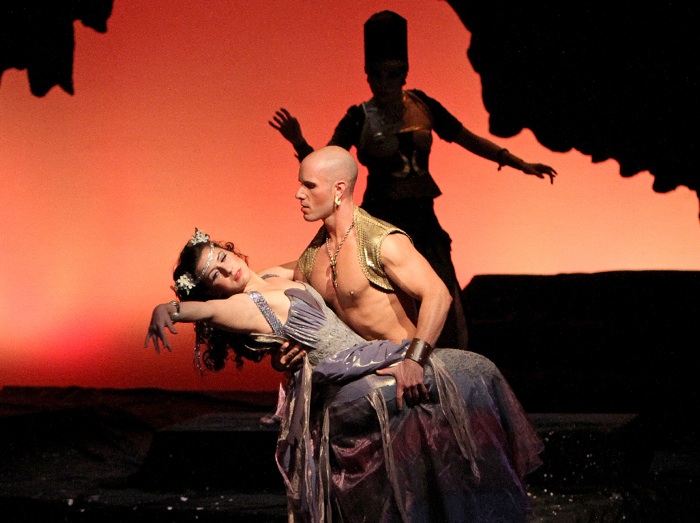They say that love will have its day. But it won’t have it at West Bay Opera, where love was the clear loser in two short operas. Brilliant direction, strong voices, and real acting kept the audience enthralled Friday night, May 21 for the opening of Henry Purcell’s Dido and Aeneas and Manuel de Falla’s La Vida Breve at Palo Alto’s Lucie Stern Theatre. And the simple sets and effective lighting polished the spell.
But what spell would be complete without meddling sorceresses or gypsy curses? Luckily, we had both.
The resonance of the two operas made for some great programming and a truly memorable evening. In Purcell’s work, the Trojan warrior Aeneas woos and wins Dido, the Queen of Carthage, only to drop her like a hot potato in order to found Rome. The slighted Dido ascends her funeral pyre in despair.
And in de Falla’s short and steamy Vida, Salud falls for a two-timing tenor, only discovering his ambivalence when he marries a wealthier woman. The poor Salud confronts him at the wedding and, when he pretends not to know her, falls dead at his feet.
Though neither heroine could bear to go on living, their arias may be immortal, a thought that director Ragnar Conde makes in his notes:
“…She is there reminding us that we can experience love so intense that it can kill.”
Purcell’s seventeenth century decorative runs and trills were a surprising fit musically with de Falla’s 1913 Andalucian embroidery, spangled notes over Spanish folk scales. General director and conductor José Luis Moscovich kept the level of musicianship superb, from the wincing strings of an older tuning to the big orchestral effects and colorations of de Falla.
Dido, sung by mezzo-soprano Cathleen Candia, entered with open-throated “Ah’s” that pulled us into the story, describing to her handmaid, Belinda, the griefs of young love. Bidding her to “shake the cloud from off your brow,” Belinda was sung by Shawnette Sulker with a high and nimble soprano. Their different timbres twinned in lovely duet. I heard Sulker star as Olympia in Tales of Hoffmann with San Francisco Lyric Opera (2007), and her high clarity and range—she played all four women protagonists—was formidable.
Purcell originally wrote Dido for an English girl’s school, and the part of her suitor, Aeneas, was essayed by the gardener. Necessarily a smaller role (although gardeners were apparently more gifted back then), Zachary Gordin filled out the role with excellent acting, using walk-on touches when not singing. Appearing in barely more than his “Trojan” loincloth, the chemistry between him and Candia was smoldering. And his velvety baritone, heard last week with the Oakland Symphony’s production of Street Scene, was perfect for the smooth-tongued suitor.
Young Mexican director Ragnar Conde was not afraid of making waves, sexualizing both court and Sorceresses with barbaric splendor. Those costumes, by Abra Berman, featured flowing red gowns with flesh-tinted cups, making it appear that the three were bare-breasted based on costumes of Minoan Crete. The Sorceress was chillingly sung and luridly danced by Carla López-Speziale, as the chorus quick-changed from courtiers to cackling creatures. Jagged skeins of black fabric and red-lit backdrop created that sinister grotto, then columns of fabric that could be tree boles descended into a wooded dawn.
The chorus was tight and full-voiced, adding men’s parts to those originally sung by women, and adding commentary like an ancient Greek Chorus. When Dido forces Aeneas away (“…that you had once a thought of leaving me.”) the chorus sorrowfully sings, “Great minds against themselves conspire/ And shun the cure they most desire.”
Dido’s last aria, the famed “When I am laid in earth” was done proud. Husky and with breathy arpeggios like sobs, Candia sang the powerful climax, underscored with harpsichord and low strings for an aching undertow.
Candia returned as Salud in La Vida Breve, changing royal languor into the quick gestures and sudden melancholy of a young maiden. Her grandmother was an even bigger shift: from Sorceress to Abuela, López-Speziale turned on the charm with elderly sighs and an eye for emotional weather. Even Gordin reappeared as a Flamenco singer at the wedding, accompanying guitarist Adrián Murillo with feathery trills and low cantillations. An off-stage tenor, the “voice of the forge,” was a lovely touch by James Stahlman.
But the big surprise was when de Falla’s two long musical interludes were choreographed by three accomplished Flamenco dancers. Javier Stell-Frésquez was particularly riveting with slow slides and sudden stomps, and his two women partners reprised the love triangle. All they needed were castanets.
This double header ended West Bay Opera’s season, a season marked by serious quality and excellent musicians under Moscovich’s tenure. The intimate atmosphere, smooth sound, and enthusiastic directing made for a thrilling production that held its own with the big boys.
All performances held at the Lucie Stern Theatre, 1305 Middlefield Road, Palo Alto (near Embarcadero). Information on the upcoming season is available at www.WBOpera.org and at 650-424-9999.
—Adam Broner
Photo: Cathleen Candia as Dido and Zachary Gordin as Aeneas; photo by Otak Jump.

